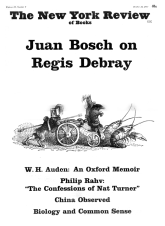In response to:
Crier in the Wilderness from the August 24, 1967 issue
To the Editors:
…Adams alleges Dahlberg despises Henry Miller, William Carlos Williams, D.H. Lawrence, and Herman Melville. Permit me to quote Dahlberg on Miller (“now and then writes in a warm simple prose, and has some comprehension of our tragic and wounded earth”) Williams (“Bill Williams, you know, had another small stroke…I would kill Nature could I save him”); Lawrence (“cast aside all the erotic rubbish, and there are some very fine lines”); Melville (“Think how much one can learn from what is unfinished or has flaws provided the Hand is Michaelangelo’s or Melville’s or Whitman’s”). These citations are all from Epitaphs of Our Times and may be found by consulting its Index. I invite Mr. Adams to do so. He obviously has not read the book.
In truth, Mr. Dahlberg is as complex a man as he is writer. There is probably no author in America as totally committed to his art. His involvement and his commitment are traditional and moral. His life is, in every sense, in his letters. Its reflection is vital, various, and involved—and always honest. All hell is in these letters, and Dahlberg has insisted on giving them to us because he realizes there is a little of his own hell in all humanity.
Harold Billings
University of Texas
Austin, Txas
Robert M Adams replies:
In response to Mrs. Tate, I honor her loyalty in supporting Mr. Dahlberg against my critique, but confess to a slight sense of vertigo on being told that Mr. Dahlberg had nothing to do with the selection of letters to be included in his published correspondence. Isn’t the subject of discussion precisely a letter of urgent importunity from Edward Dahlberg to Allen Tate, demanding that certain other letters be made available to the editor? No doubt the ultimate choice among all the letters lay with the editor; but Mr. Dahlberg fussed vigorously to ensure that certain specific materials would be in Mr. Paul Carroll’s purview. Mr. Tate (though we don’t have his side of the correspondence) evidently thought this material too cantankerous for public exhibition. Mr. Carroll evidently agreed, for he didn’t use it in the Dahlberg Reader. But Mr. Edwin Seaver printed it in extenso in Epitaphs of Our Times. I question his judgment in doing so. A sensible or sensitive person would have omitted the whole unseemly fracas—the original casus belli, and, with even better reason, the painfully petulant and self-important correspondence that grew out of it.
In Mr. Billings I am afraid I deal with a case of willful obtuseness. He wants to know where I got the impression that Edward Dahlberg did not appreciate Henry Miller, William Carlos Williams, D. H. Lawrence, and Herman Melville. Forty-two pages of the Dahlberg Reader (170-212) are devoted to a diatribe against Melville. It was by a labored interpretation of this invective that I reached the conclusion that Dahlberg didn’t like Melville. The remarks about Williams, monotonous in their iteration, are all to the effect that he wrote one good book, In the American Grain, but never developed afterwards: they are found on pages 122, 135, 137, 156, 158, 163, 169, 212, and 277 of the Dahlberg Reader. As for Henry Miller, let me finish the quotation which Mr. Billings began:
Of course, Miller now and then writes in a warm simple prose, and has some comprehension of our tragic and wounded earth. But to compare Miller with me is too bizarre! Once a gnome of the Muses had been praised, and was said to be far above Goethe. Goethe replied that the poet was very little in comparison to himself. However, Goethe added, it is not my fault; that I have so much genius is only an accident which Nature understands and I do not.
—Epitaphs of Our Times, p. 224
Finally, D. H. Lawrence. In Epitaphs of Our Times, I find on p. 83: “Poor Lawrence was an intellectual onanist, and so was de Maupassant, and one went insane and the other was worn out before he could comprehend his talents…. Like Poe, whose waste he comprehended, he himself [Lawrence] is much more trash than genius.”
I am prepared to think Mr. Dahlberg a very complicated fellow indeed, but when Mr. Billings questions the meaning of passages like these, he shows himself to be pretty simple.
This Issue
October 26, 1967



